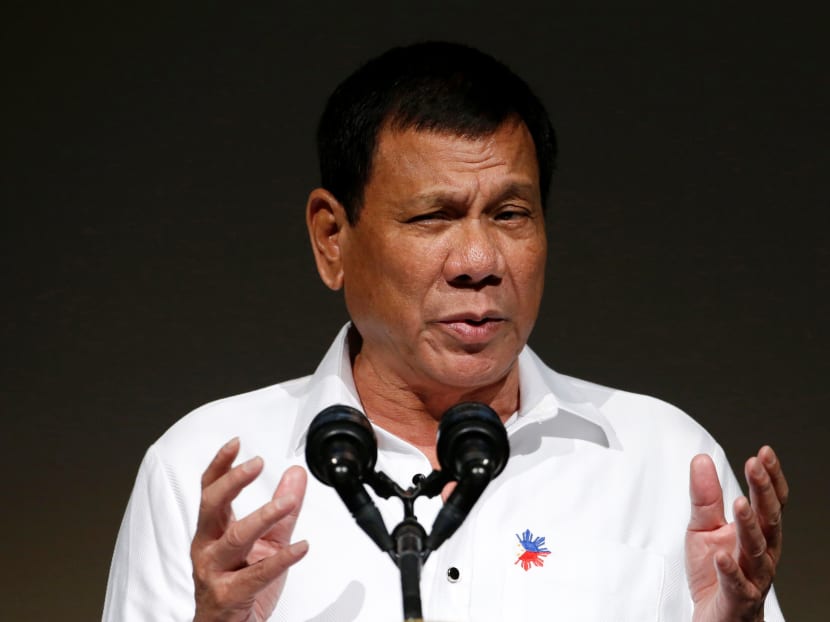Duterte insists he wants US troops out of Philippines
TOKYO — Philippine President Rodrigo Duterte, on a trip to Japan, said on Wednesday (Oct 26) that he wanted all foreign troops out of his country within “maybe two years” and that he was willing to revoke base-hosting agreements with the United States.

Philippine President Rodrigo Duterte attends the Philippines Economic Forum in Tokyo, Japan Oct 26, 2016. Photo: Reuters
TOKYO — Philippine President Rodrigo Duterte, on a trip to Japan, said on Wednesday (Oct 26) that he wanted all foreign troops out of his country within “maybe two years” and that he was willing to revoke base-hosting agreements with the United States.
“I want them out,” Mr Duterte said of the American troops in his country, adding that he was willing to “revise or abrogate agreements”.
He also repeated a recent assertion that he would withdraw from any joint military exercises with the US, a treaty ally. “This will be the last manoeuvre, war games, between the United States and the Philippine military,” he said, according to a transcript of his remarks.
The remarks, made to a group of Japanese and Filipino businessmen in Tokyo, are the clearest signal yet that Mr Duterte wants to renegotiate the 2014 agreement his predecessor reached with the US to let the Pentagon use five Philippine military bases, a central component of Obama administration’s plan to bolster American influence in Asia.
Mr Duterte’s trip to Japan is his first state visit since he said in China last week that he wanted a “separation” from the US, a remark he later softened. He told his Tokyo audience on Wednesday that he had discussed only economic matters with Chinese officials, not security or alliances.
Still, his visit puts Japan, another important ally of the US in Asia and the Philippines’ largest trading partner, in the delicate position of trying to retain a balance in an increasingly tense region where Japan fears any further tilt towards China.
Mr Duterte was more subdued in a joint statement with Japanese Prime Minister Shinzo Abe later on Wednesday. Calling Japan a “special friend who is closer than a brother”, he said the Philippines would continue to work closely with Tokyo, and uphold democracy and the rule of law in a peaceful settlement of disputes in the South China Sea.
Mr Abe said that those disputes were a “matter of interest for the entire global community” and that he welcomed Mr Duterte’s efforts “to improve and further advance the relationship between the Philippines and China”.
Japan and the Philippines also signed agreements including Japan’s provision of two coast guard boats and T-90 military trainer aircraft as part of its contribution to step up Philippine maritime security capability. Japan also agreed to support infrastructure and agricultural promotion projects in the Philippines to help economic development.
Both American and Japanese leaders have been scrambling to understand exactly what Mr Duterte, a hugely popular leader at home, has meant by his remarks about the American relationship, which at times have seemed contradictory. As recently as Tuesday, Mr Duterte had said he did not want to revoke the military alliance with the US, which has about 100 troops stationed on the southern island of Mindanao.
The Philippine Foreign Minister, Perfecto Yasay Jr, offered reassurances about the alliance in remarks to reporters after Mr Duterte’s speech on Wednesday. “There is no reason at this time to terminate our agreements because our national interests still continue to converge,” he said.
Analysts said Japan, as an ally that may have its own frustrations with its relationship with the US — and which, like the Philippines, has an American troop presence with some degree of public sentiment against it — could be well placed to play the sympathetic ear with Mr Duterte.
“Japan is in a position right now — and Prime Minister Abe, specifically — to really remind him of the importance of the United States, but also to provide a venue to let him blow off some steam,” said Dr Jeffrey Hornung, a fellow in the security and foreign affairs programme at Sasakawa Foundation USA, a research institute based in Washington.
For Japan, Mr Duterte’s stance could be troubling if it results in China gaining more maritime power in the region.
Japan also does not want any precedent set in its own disputes with China over a chain of islands in the East China Sea, where both China and Japan claim territorial rights, known as the Senkaku in Japan and the Diaoyu in China.
For the US, foreign policy experts said Mr Duterte’s passionate remarks should encourage some internal assessment of how America treats its allies. “It should cause us to be somewhat self-critical and make sure that we don’t just say ‘this guy is a Philippine Donald Trump’, but actually do a little self-examination to make sure that there aren’t ways that we handle our alliances that couldn’t be improved,” said Dr Susan Shirk, chairwoman of the 21st Century China Center at the University of California, San Diego.
Despite his strong and sometimes vitriolic rhetoric, foreign policy experts said there was still room for Mr Duterte to repair his relations with the US.
The President “is in the process of learning”, said Mr Yusuke Takagi, an assistant professor at the National Graduate Institute for Policy Studies in Tokyo. “I don’t think it’s the right time to decide to characterise the administration as anti-US or pro-China. I think it’s too simple.” THE NEW YORK TIMES









